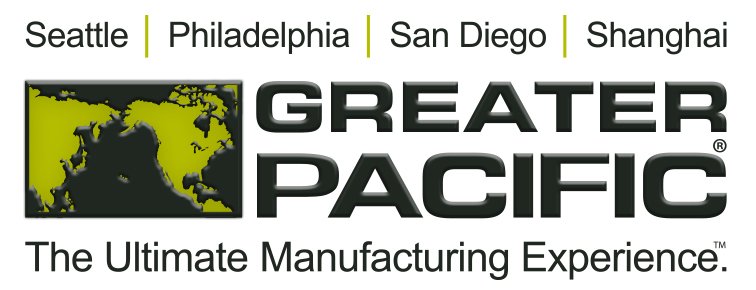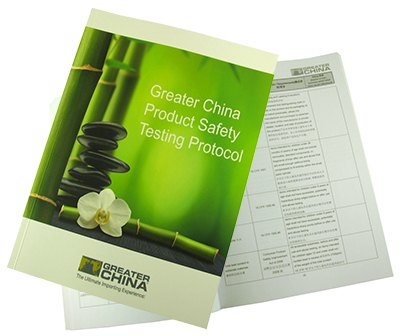Product Compliance and Safety Testing Matter
Production goes beyond producing a product within scheduling and financial constraints; it requires that the product meet the quality and safety expectations of customers as well as requirements of the CPSIA and Prop 65. For this reason, Greater Pacific has dedicated staff throughout Asia that inspect product. We also work with independent testing partners to ensure compliance with CPSIA, Prop 65 and applicable safety requirements. Greater Pacific coordinates all testing protocols during the production process (in-line) and again at the end (final) before any product is shipped. The protocols include the regulatory requirements for main product categories such as: apparel, bags, drink ware and children’s products to name a few. Some of the standards we routinely conduct testing for include: 16 CFR 1303 lead in surface coatings, FDA, BPA screening, Toxics in Packaging materials, fiber analysis, CA Prop 65 case evaluation, CPSIA lead in surface coatings and substrates, CPSIA phthalates, CPSIA physical / mechanical tests 16 CFR 1500-1501, flammability of solids and apparel, ASTM F963-11 for toys. In addition to protocols, we have a SOP (standard operation procedure) in place with lab partners to outline the scope of our testing relationship.
Greater Pacific has a Manager of Product Safety & Compliance and a China QC/QA team on site in our Shanghai satellite office who are responsible for tailoring protocol to specific products and delivering these protocol standards to our manufacturers. Our Director of Product Safety and Compliance is located in the USA. Her specific tasks include lab selection, protocol development with the 3rd party labs, rate negotiations and report review.
On going factory education is another cornerstone of our compliance process. Greater Pacific hosts on site factory training seminars and will continue to do these trainings to enforce our commitment to quality. Our core vendor factories receive a handbook outlining the expectations for working with Greater Pacific, which among other factors, outlines our safety and compliance standards, testing requirements, quality expectations, social compliance guidelines and best business practices.
Each of our projects is tested according to the audience communicated to us by our clients. For example, an adult product abides by different regulations than a child product. We are also able to test for voluntary performance standards if the client desires standards beyond mandatory requirements. If you would like to discuss the applicable standards for your order, please contact your Greater Pacific Import Executive.
CPSIA:
The Consumer Product Safety Improvement Act of 2008 (CPSIA) was passed by U.S. Congress and signed into law by President Bush on Aug. 14, 2008. CPSIA is designed to allow The U.S. Consumer Products Safety Commission (CPSC) to better regulate the safety of children's products imported for sale in the U.S. CPSIA standards apply to a young audience of 12 years and under. Each child's product is reviewed, protocol established and tested by one of our independent testing lab partners to ensure the appropriate CPSIA standards are met.
CA Prop 65:
California law that became effective in 1986. It restricts or prohibits items containing carcinogenic and reproductive harmful chemicals from entering the State of California. Greater Pacific carefully monitors CA Prop 65 settlements to keep apprised of new developments. In addition, our independent testing lab partners distribute periodic newsletters for updates to CA Prop 65 and related topics. We offer testing and compliance protocols for CA Prop 65 upon request.
Social Compliance Audits:
We are partnered with a 3rd party independent audit firm that is capable of performing social compliance audits as required. A thorough audit assesses the following areas: child labor, forced labor, health/safety, freedom of association, discrimination, disciplinary procedures, conditions of the dormitory/canteen, hiring contracts in place, working hours, attendance records, wages, over time compensation, and social insurance system.
C-TPAT:
Greater Pacific is C-TPAT certified! This is a transportation security certification. It became very popular after 9/11. Companies and their suppliers go through different tiers of certification to ensure goods shipping into the US do not contain weapons, harmful substances, or potentially hazardous materials. Greater Pacific only works with C-TPAT certified freight forwarders.
FDA Testing:
Generally this applies to drink ware and food serving containers. Greater Pacific implemented the required FDA testing for these products and monitors continual compliance. All mugs, bottles, cups, plates, and food related products are tested to the applicable FDA food contact testing. The specific tests are based on the material or plastic resin code. In addition, Greater Pacific complies with regulations for BPA as outlined below.
Bisphenol A (BPA):
Is a chemical most often used in plastics. We make every effort to source BPA free drink ware and tableware due to numerous state requirements at this time as well as pending federal standards. If clients communicate their distribution points to Greater Pacific, we can be sure to test accordingly for these States.
Lead:
Is a hazardous substance that is most commonly found in surface coatings and substrate materials. In the past it was used as a drying agent ingredient in many products and is a very common cause for product recalls. The regulation regarding lead is CFR 1303. The maximum permissible lead amount in most products is 90 PPM (parts per million). Lead testing is accomplished through lab testing by scraping off surface coatings (every color) from products. This includes logos applied with ink, tags with ink, and even clear lacquer coatings. Greater Pacific tests every project for lead to ensure compliance with 16 CFR1303.
In addition to federal lead limits, Greater Pacific is also cognizant of the Illinois lead poisoning Prevention Act. Please let us know if your product is intended for use in the state of Illinois.
Phthalates:
Currently there are no federal regulations for phthalates with respect to items for use by adults, however, they are banned in children's toys/child care articles. The CPSIA has set a maximum limit of 0.10%. Phthalates are referenced in section 108 of the CPSIA. Greater Pacific tests for these in all children's products and where relevant.
“Greater Pacific has dedicated QA and QC staff on the ground as well as independent testing partners that ensure product compliance and safety.”
Greater Pacific Product Safety Testing Booklet:
Greater Pacific is committed to product safety! In addition to developing testing protocols for every order we take and hosting periodic vendor training seminars, we have created our own Product Safety Booklet. These booklets are distributed to our core and non core vendors as a guideline to follow when working with Greater Pacific. The information includes common product protocols and material from our vendor training seminars. As regulations change and evolve we will update this guide periodically for vendor use. A few of the many areas are as follows:


